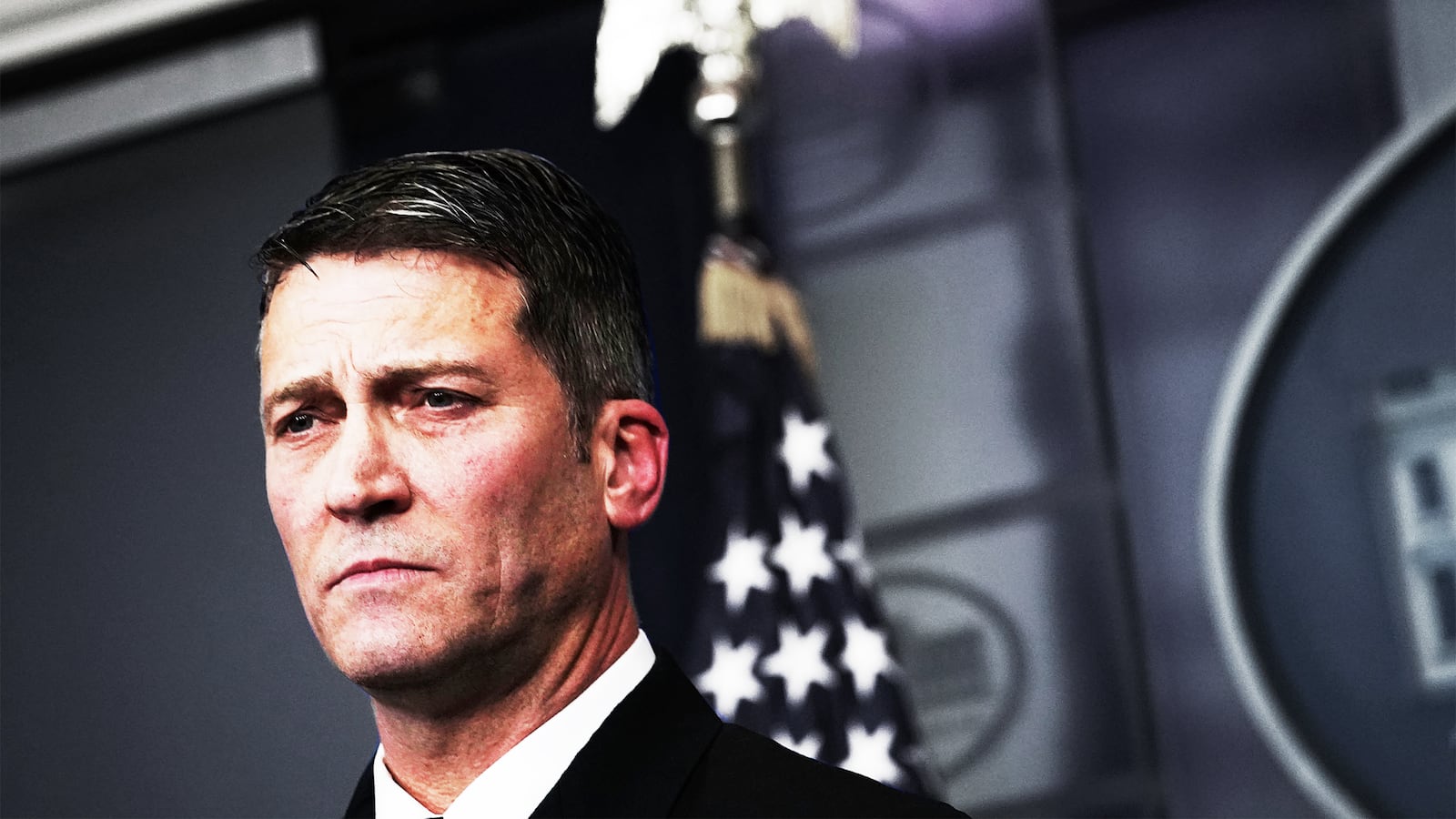“Without warning or explanation, a member of the medical team entered and began handing out sleeping pills like candy.”
That’s a sentence from my recent memoir, Thanks, Obama, describing an overnight trip to Germany in 2015. I thought I was setting up a harmless story about trying and failing to undress discreetly in the coat closet of Air Force One. I never dreamed I was writing about a future would-be cabinet secretary, one whose nomination flamed out in dramatic and public fashion.
Yet here we are. In addition to being the pill hander-outer from my anecdote, Ronny Jackson was the personal physician to Presidents Barack Obama and Donald Trump. And, up until Thursday morning, he was also the latter’s nominee to run the Department of Veterans Affairs.
To my surprise, passing around prescription drugs is one of several allegations that sunk his nomination. Back when I was reclining in my leather seat in the Air Force One staff cabin, a small ziploc baggie clutched in my outstretched hand, my greatest concern about sleeping pills was that they could leave me drowsy if POTUS wanted to go over his speech the next morning. I never thought I was witnessing potentially scandalous behavior.
In some ways, I still don’t. Even in retrospect, the sleeping pill dispensing doesn’t seem like that big a deal. Presidential staffers are expected to hop between time zones without missing a beat. If anything, on my sole foreign trip as a presidential speechwriter, having a Navy doctor pass out sleeping aids added to the quasi-military sense of mission that animated Air Force One. It was the same patriotic thrill I got the first time a flight attendant justified the ludicrously high-calorie meal by telling me “An army marches on its stomach.”
As White House staffers, we were supposed to conk out on command and awake ready to flawlessly execute. I actually regret not taking a pill (it was cold; I slept badly) but I don’t regret being handed one. It didn’t make me feel sketched out. It made me feel special.
In retrospect, that’s how all my interactions with Dr. Jackson felt. There weren’t too many of them – a passing greeting on the plane, maybe some small talk backstage at an event – but each one left me feeling included. I was part of a small, secret club. Coming from someone in regular contact with POTUS, someone whose military bearing left me both intimidated and impressed, even a simple nod of recognition could be enough to add swagger to my step.
I knew my colleagues’ encounters with the doc were similarly swagger-inducing. Which is why, a few hours after President Trump nominated him, I confidently tweeted that Ronny Jackson was “a decent guy.”
That’s the piece of writing I now regret.
Far more disturbing than a few stray Lunesta, in my opinion, are the accusations that have emerged from the White House Medical Unit which Dr. Jackson oversaw. “The most unethical person I have ever worked with.” “Toxic.” “Abusive.” “Volatile.” “Vindictive.” “Belittling.” “The worst leader I have ever worked for.”
These are not descriptions of a decent guy. Are they accurate? Is Ronny Jackson the upbeat backslapper from my experience or the borderline psycho from anonymous reports?
I’ll say now what I should have said weeks ago: I don’t really know.
Looking back, I don’t wonder how I could have been so wrong about the president’s doctor. What I wonder is how I could have been so confident about him. Why did I mistake my brief glimpses of a man for the full picture of his character? Why was I so convinced my positive impression was correct?
That’s the nature of sycophancy. The “kiss up, kick down” attitude that defines countless horrible bosses, especially in politics, is surprisingly hard to spot—and that’s especially true when you’re on the receiving end of the attention. For one thing, it didn’t occur to me that in my own, middle-of-the-org chart way, having a White House job made me worth sucking up too. I knew that plenty of people in Washington kiss ass to get ahead. I just never imagined my ass might be the one getting kissed.
If I’m being honest, however, I also have to admit that part of me must have welcomed the special treatment. When it’s someone else being fawned over, toadyism is obvious and obnoxious. When you’re the one on the receiving end of the fawning, however, it feels less like fakery than confirmation. Why, yes, I am indeed extremely wonderful. Thank you for noticing.
Three years after accepting my pill baggie, I now think of my story as a warning, not about the dangers of pharmaceuticals but of flattery. Those of us hoping to wield power—even power of the modest and/or make-the-world-better variety—would do well to avoid my mistakes. Don’t confuse charm with character. Don’t assume you’re too unimportant to garner sycophants’ attention, or too savvy to succumb to their appeal. Don’t underestimate how difficult it is to find people willing to tell you no. And don’t forget that if these things aren’t easy for mid-level White House staffers, they must be near-impossibly hard for presidents.
Which brings us to the current one. President Trump isn’t merely susceptible to flattery. He requires it. Just witness his cabinet meetings, where heads of federal agencies compete to out-grovel each other on camera. Or his bilateral press conferences, where heads of state have discovered that Trump-era diplomacy is mostly about praising Donald Trump.
And let’s not ignore the fact that Ronny Jackson’s most well-known public moment until now came when he almost certainly lied about the president’s height and weight. The main reason he was tapped run the VA, in other words, was his willingness to humiliate himself to stroke the ego of the Commander-in-Chief.
A talent for flattering the powerful might be considered a qualification in the Trump White House. But as we’ve been reminded this week, it’s all too often paired with a disregard for everyone else. Is Ronny Jackson a good person? I no longer pretend to have an answer to that question. But I do know I’m glad he won’t be running the VA.






